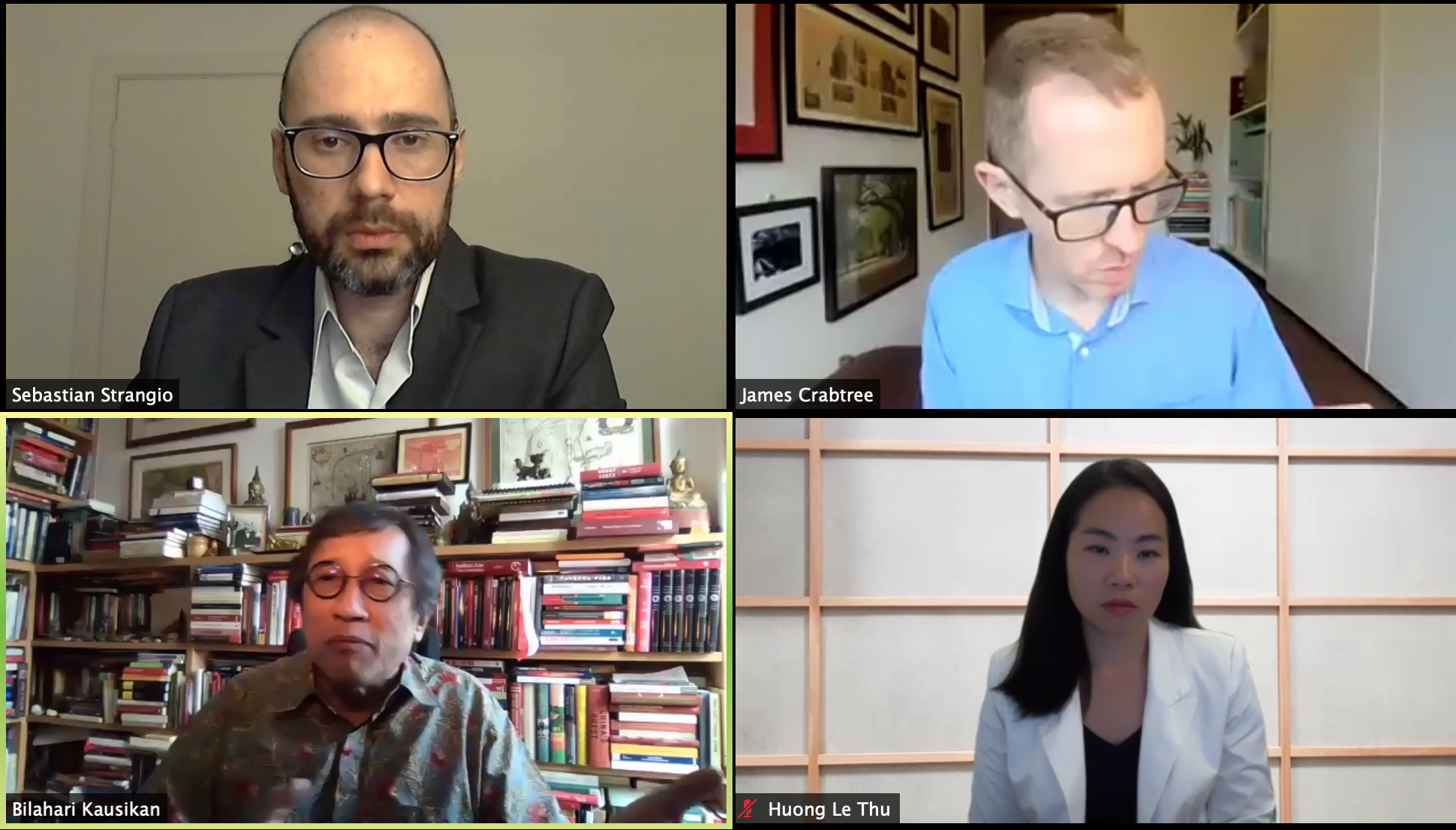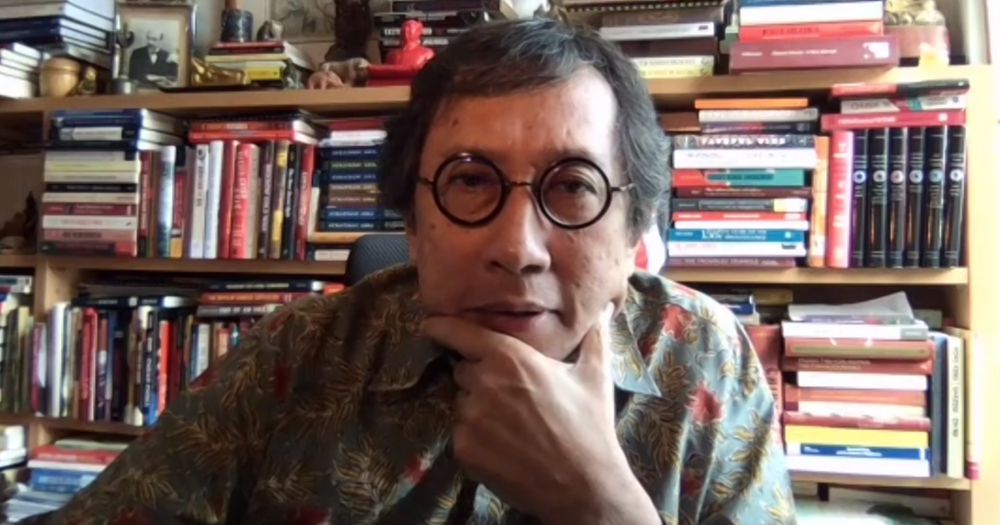China and the United States are big countries, but Asean does not face a binary choice between the two, retired Singaporean diplomat Bilahari Kausikan opined.
Asean is complex & can't be reduced to a "two-horse race"
The former permanent secretary of Singapore's Foreign Ministry was speaking at the virtual launch of journalist Sebastian Strangio's new book, titled "In The Dragon’s Shadow: Southeast Asia in the Chinese Century", held on Tuesday, Aug. 18.
 Screenshot via Zoom session by Lee Kuan Yew School of Public Policy
Screenshot via Zoom session by Lee Kuan Yew School of Public Policy
There is "a fundamental misunderstanding" of Southeast Asia, as some continue to think that the region only faces binary choices, he said.
In discussions about China’s relations with Southeast Asia, which often include the U.S. implicitly, many assume that the region is inhabited by “morons incapable of counting beyond two”, he continued.
The undiplomatic diplomat, as he has been called, said: "Only the simple minded and probably the partisan assume that one must necessarily win and the other lose, as if the complex international relations of this region could be reduced to a two-horse race."
As the world shifts towards a multipolar world, Bilahari reiterated that regional geopolitics for Southeast Asia isn't simply limited to the U.S. and China, but also other strategic actors that carry some weight, such as Japan, Australia, South Korea, and Russia.
Previously, Singapore's Foreign Affairs Minister Vivian Balakrishnan has also expressed a similar viewpoint, saying the world is moving from a unipolar setup to a multipolar one.
He cautioned against looking at things in binary terms, such as "enemies and friends", and said the "old canard (that) you are either with us or against us does not work in a multipolar world".
Multipolar world means region has agency
In explaining why he does not particularly agree with the title of Strangio's new book, which he praised as "a fine work", Bilahari spoke further on what the region's multipolarity means for the countries here.
The region's multipolarity "creates agency to pursue our own interests because it widens the space and opportunity for maneuver", he said, adding that countries still need to have the wit to recognise their agency, and the courage and agility to use it.
Such multipolarity is "asymmetrical" and "dynamic", he said.
"U.S.-China relations will form the central axis around which other countries, big and small, will continually arrange and rearrange themselves in fluid combinations."
As countries' interests in different domains might differ, Bilahari said a "static alignment across all domains is improbable".
This century "will not be defined by any single country", he opined.
China has failed to reassure small countries
Going into his thoughts on China, Bilahari agreed that the country has a huge and influential presence in Southeast Asia, but pointed out that its geopolitical proximity to Southeast Asia will always "evoke concern" in the region.
"China is undoubtedly influential, but distrusted," he described the Southeast Asian region's relationship with China. "China's rise is a geopolitical fact that cannot be ignored. China's rise is challenging, but also replete with opportunity."
In explaining the region's distrust towards China, he said that China has failed to reassure smaller countries in Southeast Asia that its political intentions are benign.
"On the contrary, Beijing has behaved aggressively in pursuit of his interests. And there is also a certain cultural autism in Chinese diplomacy in Southeast Asia, that has accentuated the anxieties of the region.
Chinese diplomats and officials, often seem to think that all they need to do is offer generous aid trade, investment and all will be well... the economic factor is indeed crucial, but not all Southeast Asians are for sale or if bought, are going to stay bought," Bilahari elaborated.
U.S. not particularly trusted either
As for the U.S., while it is "an offshore balancer" and a geopolitical fact that cannot be ignored, it is also not particularly trusted in the region, said Bilahari.
U.S. allies will "constantly oscillate between fears of abandonment and fears of entanglement", he said.
While these concerns have been accentuated with the Trump administration in power, he said they will not be erased even if Trump is not re-elected.
The Goldilocks zone is hard to reach.
"The porridge of the offshore balancer is always going to be too hot or too cold, and no administration... has ever got the temperature just right," Bilahari said.
"President Obama made elegant speeches, but clearly had little stomach for the strategic rivalry that is an inescapable reality of major power relations in any system or sovereign states."
Southeast Asia's "diplomatic dance" to balance U.S. and China influence
With Southeast Asia's strategic geopolitical location connecting the Pacific Indian Ocean, the region has historically had to deal with the interests of major powers, and sometimes conflicting powers.
"Faced with major powers that cannot be ignored but are not trusted, the countries of Southeast Asia are today responding as they have responded since time immemorial, by dancing, and the steps of that diplomatic dance are intricate," Bilahari explained.
He elaborated that Southeast Asian countries have evolved their diplomatic instinct over centuries to "balance, hedge, and bandwagon" simultaneously in the midst of major power rivalry, namely the U.S. and China in today's context.
Furthermore, the U.S. and China are not the only powers that hold weight in the region, creating a "natural multipolarity" that facilitates the diplomatic strategy of Southeast Asian countries, he said.
To illustrate the non-binary behaviour of Southeast Asia, Bilahari brought up an example of Singapore's telecommunications industry.
Two major service providers, where the government is the major shareholder "by coincidence", decided on their own volition, not to use Huawei for the island wide 5G network, he said.
But the Chinese tech giant was not banned from bidding for anything, as a minor service provider is apparently going to use Huawei for "some local networks", he added.
"Even in a rather flawed situation, there is always agency... if you have the wit to see it, and the ability to use it," he opined.
Not in China's interest to break up Asean
In response to a question whether it was China's objective to break up the ASEAN consensus, the veteran diplomat disagreed with the notion.
"I don't think it is in China's interest to break up Asean," he said, adding that it is in China's interest "to try to capture Asean".
This is because it does not serve the Chinese purpose to break up the regional bloc, he explained.
"In 2012, working through a particularly stupid foreign minister Hor Nam Hong, who didn't even know his own interest was merely venal, (Cambodia) blocked an Asean consensus on one issue, the South China Sea," he recalled.
"They blocked it for about a week, whereupon I think common sense, even in Cambodia, reasserted itself, and a minimum consensus was a bit belatedly re-established."
He conceded that it was unlikely for Asean to achieve beyond the minimum consensus on the South China Sea issue, but added a historical insight that Southeast Asia has never been under the complete influence of any single power, with the short-lived exception of the Japanese Occupation during the second world war, which "did not end well".
"It's just too complicated (of) a region... to be held in totality by one single power," he said.
Top image via Zoom session by Lee Kuan Yew School of Public Policy
Totally unrelated but follow and listen to our podcast here
If you like what you read, follow us on Facebook, Instagram, Twitter and Telegram to get the latest updates.
